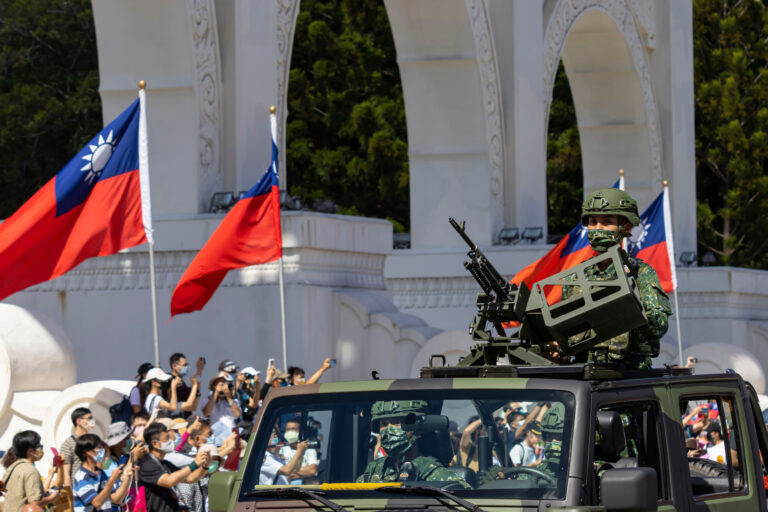Two recent incidents have raised worries about a possible intensification of activities by pro-Beijing organized crime in Taiwan as China continues to intensify its pressure campaign against the democratic island-nation.
The first incident occurred early in the morning of August 28 in Linkou, New Taipei City, when internet celebrity and gym owner Holger Chen (陳之漢) was shot at three times at close range as he was entering his vehicle. Two of the three bullets hit their target, causing leg and arm injuries. In recent years, Chen has been an outspoken supporter of President Tsai Ing-wen (蔡英文) and the Taiwanese military, and was also involved in an “anti-red media” (反紅媒) movement organized by New Power Party (NPP, 時代力量) legislator Huang Kuo-chang (黃國昌) in 2019 (the movement sought to raise awareness about Taiwan-based media that are unduly influenced by China). His outspoken support for a Taiwanese identity also caused controversy last year, leading Chinese kickboxer Lian Yuxuan (練喻軒) to challenge him to a fight.
Around that time, Chen also came to the attention of criminal organizations in Taiwan, as well as the China Unification Promotion Party (CUPP, 中華統一促進黨)—the political party established by a former triad leader—leading to alleged threats. It was initially believed that potential disputes over his gym empire or online retail efforts may have led to the attempt on Chen’s life. However, it later emerged that the 23-year-old shooter, Liu Cheng-hao (劉丞浩)—who had been involved in a previous altercation with Chen—was a member of the Bamboo Union (竹聯幫), one of Taiwan’s primary “mainlander” triad organizations. More specifically, Liu was affiliated with the Baohe Association (寶和堂), one of eight “churches,” or factions, within the Bamboo Union. The investigation also revealed that Liu was associated with a middleman named Shih Jun-ji (施俊吉), 40, who surveilled the location before Chen was shot. Surveillance and communication records also demonstrate that Shih ordered Liu to carry out the hit on Chen. A total of 10 Bamboo Union members were subsequently taken in for interrogation by the Taipei and New Taipei City Prosecutor’s Office.
It has been since been alleged that a sum of NTD $10 million (approximately USD $350,000) was transferred from China to Taiwan via businessmen and organized crime organizations to “buy” Chen’s murder.
Ties between the CCP, the CUPP, and the Bamboo Union were established years ago and received greater attention when CUPP founder and former Bamboo Union head, Chang An-le (張安樂)—aka “White Wolf”—returned to Taiwan in June 2013 after being on the run for more than a decade. The CUPP, which promotes unification under the “one country, two systems” (一國兩制) formula, has been involved in threats, intimidation, and physical assault against members of Taiwan’s civil society. Most of these incidents have involved Bamboo Union members or hired hands from other local crime syndicates. It has also collaborated with triads in Hong Kong to threaten pro-democracy activists from Hong Kong during visits to Taiwan (the Four Seas Gang [四海幫], another “mainlander” triad, is also believed to have been involved in this altercation). In recent years, the CUPP has been the target of investigations and raids by special prosecutors to determine whether the organization, which is registered as a political party in Taiwan, has been receiving illegal funding from China. It is also suspected that the CUPP may be recycling money from China via companies owned by Chang and his son, namely the Taolue Group (韜略集團) and its subsidiary, Strategic Sports Ltd. (韜略運動器材).
Although Taiwan has strict gun control laws, crime syndicates are heavily involved in gun trafficking. Consequently, the overlap of interests between politicized pro-Beijing triads and pro-unification groups like the CUPP, which act as CCP proxies, presents a worrying problem for law enforcement and intelligence agencies. Given the high risks involved with an attempted invasion of Taiwan by the People’s Liberation Army (PLA), it is arguably far likelier that the CCP’s strategy will involve attempts to destabilize Taiwan through more insidious strategies, including acts of violence against pro-Taiwan/democracy elements within society. Part of this strategy may also involve the hope that Taiwanese organizations will retaliate violently, potentially sparking a cycle of escalatory violence which could “compel” intervention by the irredentist neighbor, much like Russia’s invasion of Ukraine in 2014.
In 2018, the largest cache of firearms in a decade was seized in Keelung. The weapons, which originated in the Philippines and were transited via Hong Kong before arriving in Taiwan, consisted of 109 firearms, including Bushmaster XM15-E25s, Spike’s Tactical ST-15s, and a Striker-12 shotgun, as well as 12,378 rounds of ammunition. One officer said of the arsenal, “You could set up an army with those!” Yeh Jiunn-rong (葉俊榮), the Minister of the Interior at the time, said that if the guns had entered the Taiwanese market, “the consequences would have been disastrous.” The individuals arrested in the case were members of the Bamboo Union.
The attempt on Chen’s life is not the only recent instance involving violent elements belonging to pro-Beijing organizations and possible funding from China. In late September 2019, CUPP member Hu Chih-wei (胡志偉) and Dachen Nostalgia Culture Association (大陳島鄉情文化促進會) member Chen Yu-ta (陳友達) were arrested following an incident in which Hong Kong democracy activist Denise Ho (何韻詩) was splattered with red paint at a rally in Taipei. Prosecutors determined that a total of nine individuals were involved in the plot. (While anti-independence and pro-Kuomintang, the Dachen Nostalgia Culture Association, which was established as a hometown association for people that trace their ancestry to a region in Zhejiang, is not known to be directly affiliated with the CCP.)
Then, in April 2020, Causeway Bay Books manager and CCP critic Lam Wing-kei (林榮基)—who relocated to Taiwan after his bookstore was closed in Hong Kong—was the victim of a similar paint attack on his store in Taipei. Two individuals, one surnamed Tseng (曾) and another surnamed Cheng (鄭), were subsequently arrested in Kaohsiung in connection with the case. Two other suspects were also involved as lookouts and were seen fleeing with the two assailants in a taxi (a third suspect was eventually detained). A few days after the incident, an individual posted a comment on the Mainland Affairs Council’s (MAC, 大陸委員會) official Facebook page warning Lam: “This was only a first warning to you. We have many brothers in Taipei” (“這只是我們對你的第一次警告,我們在台北的兄弟很多”). The Facebook profile of the individual, one “Jonathan Gao,” showed that he was a member of the Republic of China Patriots Association (中華愛國同心會), the CUPP, and the Hongmen 21 Sea Friendship Association (洪門二一海聯誼總會員工). Also known as the “Heaven and Earth Society” (天地會), Hongmen is a secret organization created during the Qing Dynasty. It later developed various underground organizations and spread throughout Asia.
Subsequently, in October 2020, a suspect was apprehended following an attack on the Aegis restaurant (保護傘) in Taipei, in which an individual threw a bucket of fecal matter at the cashier counter and kitchen. One employee, of Hong Kong origin, was also splashed with the substance. Opened in April and founded by Hong Kong lawyer Daniel Wong Kwok-tung (黃國桐), Aegis seeks to provide employment for residents of Hong Kong who have fled the Special Administrative Region following the 2019 anti-extradition law protests. The suspect, surnamed Mo (莫), told police that he had received NTD $15,000 from three individuals to perpetrate the attack. Two other suspects, both in their 20s, were subsequently detained, including a 24-year-old man surnamed Lee (李), who has emerged as the main suspect in the case. Lee, a member of the Bei Lien (“North Union”) gang (北聯幫), is said to have been given NTD $30,000 by “the puppet master” (藏鏡人) to orchestrate the attack. In November 2019, the leaders of various triads from Taiwan and Hong Kong—including the head of the Bei Lien gang—attended the 70th anniversary party in Taipei of Bamboo Union boss Huang Shao-tsen (黃少岑), aka “Mo Mo” (么么). The CUPP’s Chang An-le was also present at the event. While circumstantial, this nevertheless demonstrates the potential for collaboration between the main pro-CCP triads and more local gangs, which the former has employed over the years to conduct low-level operations such as security and intimidation.
This series of incidents suggests intent by organized crime and their contacts within the CCP to escalate their operations against pro-independence elements in Taiwan, as well as Hong Kong democracy supporters, refugees, and others. The potential for major acts of violence, such as the attempted murder of Holger Chen, will require particular attention by Taiwan’s law enforcement and intelligence agencies, which will have to collaborate in instances where criminal activity coincides and overlaps with political work.
The main point: The Chinese Communist Party, by and through its proxies in Taiwan, appears to be escalating its efforts involving organized crime to intimidate and assault pro-independence and pro-Hong Kong democracy elements within Taiwan. Such activities represent a threat to social stability in Taiwan and pose a challenge to its law enforcement and intelligence agencies.



